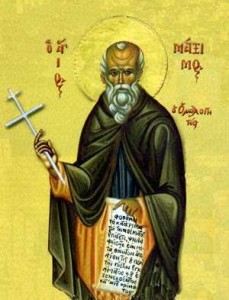Saint Maximus the Confessor and the Humbled
Aug 12, 2011 by Nick Rabiipour

Early Life: Saint Maximus the Confessor was born to Byzantine nobility and quickly became involved in Byzantium's political atmosphere. After being chief secretary to the Emperor Heraclius, he had a powerful conversion experience that would change his life forever.
Introduction to religious life: Upon leaving his position, he became a monk and spiritual student to Saint Sophronius. He quickly ascended to the position of Abbott of Chyrysopolis. However, the monastery was continually assaulted by the Persians and therefore St. Maximus the Confessor moved to Carthage.
Life as a Theologian: In Carthage, St. Maximus the Confessor studied Christology and began to write numerous letters and other writings against the developing Monothelitist heresy which declared the one divine will of Jesus. He wrote many letters to Pyrrhus, the then Abbott of the monastery St. Maximus the Confessor left, and Pyrrhus eventually denounced his monothelitist views after being Patriarch of Byzantium for a short period. Together Pyrrhus and St. Maximus the Confessor then went to Rome for the Lateran Council of 649.
Persecution and Exile: St. Maximus the Confessor, well into his 70s, was then summoned to Constantinople where the new Emperor and Patriach found him guilty of heresy as they did not favor the Dyothelite position, two wills of Jesus Christ, but rather favored the Monothelite position. St. Maximus the Confessor was then exiled for 4 years only to be tried of heresy again and found guilty again. This resulted in him having his right hand and tongue removed, being flogged, and being paraded around the city. These measures were taken so that he would no longer spread his views. St. Maximus the Confessor died shortly after.
The Uniqueness of St. Maximus the Confessor
- St. Maximus the Confessor is unique in that he is venerated by both the Roman Catholicism and Eastern Orthodox as the Theologian.
- He is also unique in his experience of public humiliation, torture, and exile which is unbecoming of most saint theologians.
- Furthermore, one cannot help but be impressed with the fact that strange lights have been reported hovering over his tomb and his Life of the Virgin is thought to be one of the oldest biographies of Mary the Mother of God.
- Lastly, he has over 90 published works on mysticism, dogma, and theology. Some of which were written during his first exile. Obviously exile did not discourage him from spreading the truth. St. Maximus the Confessor's work on Cosmic Liturgy has been well-praised as well.
- Saint Maximus the Confessor's feast day is August 13th.
To harbor no envy, no anger, no resentment against an offender is still not to have charity for him. It is possible, without any charity, to avoid rendering evil for evil. But to render, spontaneously, good for evil - such belongs to a perfect spiritual love.”
- Saint Maximus




